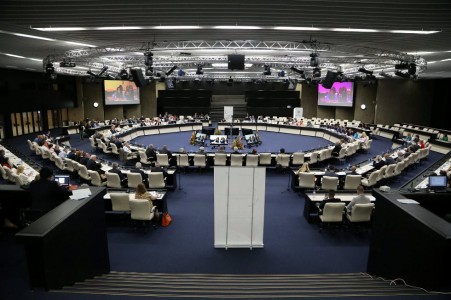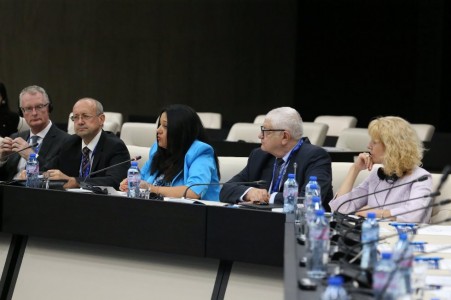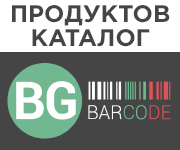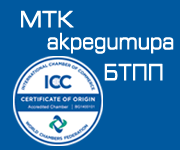European Parliament of Enterprises /EPE/
European Chambers of Commerce stand behind consensus, competitiveness and cohesion of Europe. This was the accent of the event held in Sofia on 11 June. г.
Bulgarian entrepreneurs are supporting the European integration of Bulgaria. SMEs are accepted as a dynamic system that is developing constantly, said Tsvetan Simeonov, President of the Bulgarian CCI. “We firmly believe that faster reactions on behalf of EU in regard to facilitation of trade and improving of business environment would have big effect and could position better EU in the world economy.” Considers Simeonov.
The future of Europe is important so we cannot leave it to politicians, said Dr. Christoph Leitl, President of Eurocambres during the EPE in Bulgaria.
“As an entrepreneur I use every opportunity to pick up ideas. A lot of ideas were shared during the discussions in Sofia. As a result, dual education, digital single market and clusters for SMEs will become priority for EUROCHAMBRES. “
Companies - participants in EPE debated and voted on the following questions:
EU single market
- When you have plans to offer services abroad, do you have the feeling that you need to comply with too many unfamiliar national rules of the country of destination? Yes – 80% No – 20%
The unity of the European market includes the freedom of movement of people, goods, services and capital. But national service rules often confuse and hamper business.
Removing disparities in national regulatory regimes that undermine the Single Market must be done swiftly and effectively. The most disturbing is the lack of progress in services. According to the Single Market Scoreboard, the average member state trade integration in 2015 for services stood at only 6,6%, compared to 20,6% for goods.
1.2.
Would it be useful for you, when you want to offer services abroad, to communicate with your own local authorities instead of the authorities of the country of destination? Yes – 80%, No – 20%
National institutions that can provide useful guidance and information to companies wishing to offer services abroad are preferable as a source. Companies feel more secure by communicating with CCIs from their own country and know they will receive processed information that is verified and credible. Trust in CCIs is proven by the long history of these organizations - in the case of Bulgaria BCCI more than 120 years.
On the other hand, the lack of knowledge of institutions in the country where the company wishes to offer services is a prerequisite for communication difficulties, requirements, fees, etc. that are not known and impede communication.
1.3. Do you have the impression that certain countries impose an illegitimately higher burden on foreign service companies? Yes – 82%, No – 18%
National laws are restrictive in some cases and impose greater burdens on foreign companies providing services in a particular country. With the protection of native companies it is often speculated - for economic or political reasons, but EU countries have a lot to improve in terms of taxes, requirements and conditions for payment that must be met by foreign service companies.
1.4. In my company, we are now handling most of the standard VAT, tax, social insurance and obligatory reporting, such as statistics issues by electronic means with
Bulgarian public authorities 53%
public authorities in the other EU Member States – 47%
Globalization leads to more advanced trading, services and interaction. This implies reporting to both national institutions and the EU.
1.5. The biggest potential but not yet harvested revenue for my company from fostering the digital-by-default principle in communication with public authorities lies in electronic communication with:
the Bulgarian authorities - 72%
the EU authorities – 28%
Companies believe that the use of information and communication technologies to provide public services at national level is not yet fully exploited. The introduction of e-government is a fact in some EU countries, but not real in Bulgaria. Achievements in the service of the NRA, the Trade Register, the NSSI and some municipal services have, but this is not a functioning e-government.
Trade and Investments
2.1. Is your company sufficiently aware of the benefits of EU Trade agreements? Yes – 37%, No – 63%
The language of the agreements is not understandable for SMEs. The information provided is contradictory and sometimes the there is speculative effect. In a number of countries, there is strong opposition for and against a specific free trade agreement. This prevents companies from clarifying what opportunities are available to them.
2.2. Are the texts of a free trade agreement brought to you in a way that you understand what is in it concretely for your company? Yes – 21%, No – 79%
SMEs do not feel that the texts of the Free Trade Agreements are written to be understood. They are accepted as the face of every administration - confusing, vague and always subject to interpretation.
2.3. . Do you consider the EU should continue discussing and concluding Trade agreements with other countries/regions.? Yes – 73%, No – 27%
Companies believe that globalization requires the conclusion of such agreements. This is the future of the world economy.
2.4 Do you find the rules of origin in trade agreements too complex to be able to utilize the tariff liberalization? Yes – 72%, No – 28%
This is the main reason why companies do not benefit from tariff liberalization. Many rules do not make it easier, but on the contrary - complicate things for the business, which everyday needs to "fight" with many sheets of documentation.
SMEs and Entrepreneurship
3.1. Are SMEs and SME stakeholders adequately consulted during the law-making process? Yes – 17%, No – 83%
Companies believe that consultations with SMEs during the development of the legislation are insufficient. It is therefore advisable to pay attention to the "Think Small First" principle in the legislative process. Тhe “think small first principle” should be placed at the heart of EU trade policy so as to give SME a strong voice and the right tools in trade negotiations.
3.2. Is the impact of forthcoming legislation on SMEs adequately assessed (e.g. compliance costs)? Yes – 4%, No – 96%
Impact assessment is not done correctly. Companies might be asked about the expected results of future legislation but not efficiently. European and national law makers do not consider impact assessment even if there is such.
3.3. Do administrative, legislative or fiscal exemptions discourage businesses from scaling up their activities? Yes – 46%, No – 54%
Companies consider that administrative, legislative and fiscal exemptions are not basic factors for SMEs to grow up and develop further.
3.4. I know enough about how and where to finance by business. Yes – 54%, No – 46%
Companies share that on one side they have information how to finance their business and on the other that such information is missing. There are also cases in which companies know how but information and documentation is so complex, detailed, requires legal advice and is more an obstacle for taking decision in this regard.
3.5. / Tax rules and procedures in my country are clear and I understand them well. Yes – 54%, No – 46%
More than half of the companies confirm they know and understand tax rules and procedures in their country. The rest are not aware.
Skills
4.1. Should vocational education & training be a funding priority for the next multiannual budget period? Yes – 96%, No – 4%
Bulgaria regulated not long ago innovation in education – starting training in entrepreneurship from the first grade in schools. The results of this step will be available in 20 years but are promising.
4.2. Do you believe that apprenticeship schemes are considered a positive career route by Bulgarian school-leavers? – Yes – 85%, No – 15%
A big number of the active now entrepreneurs had dual education decades ago. Their achievements now are numerous and this practice of learning by doing should be revived.
4.3. Should work-based learning be integral to all initial vocational education & training programmes? Yes – 88%, No – 12%
Companies take the position that studding and practicing go along together. This is one of the most useful approaches in dual education.
4.4. Would your company be willing to contribute to the cost of improvements in work-based learning opportunities for apprentices in Bulgaria? Yes – 63%, No - 36%
The readiness of companies to provide resources to qualify their staff is showing their growing up as employers and as producers of future working places.
4.5. / Should more be done at EU level to tackle labour shortages? Yes – 81%, No – 19%
Entrepreneurs need support especially in the moment when not only EU but also other parts of the world are fighting challenges like labour shortage, lack of skilled people with specific knowledge.
Още новини:
-
08-06-2018
-
07-06-2018

 1 USD =
1 USD =  1 GBP =
1 GBP =  1 CHF =
1 CHF =  ISO 9001:2015
ISO 9001:2015





























